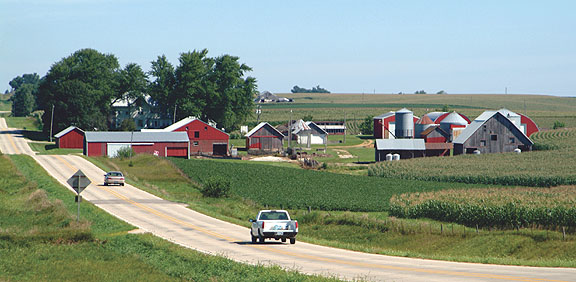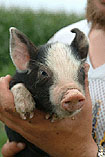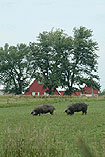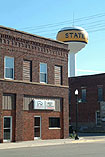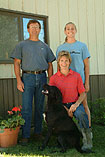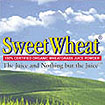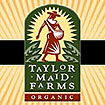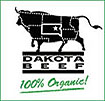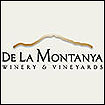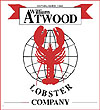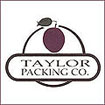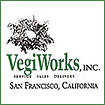|
| Click
on Images
to Enlarge and
for Captions |
|
|
|
|
|
 |
|
The
morning sun peeks over the horizon and
illuminates scattered pens of plump, contented
livestock. The lethargic pigs roll onto
their feet and saunter about in their
spacious pen, poking at the air with their
snouts. Out on the fields, an ocean of
crops glisten yellow and green. The wind
stirs the smell of hay, manure, and morning
dew into a nostalgic aroma under Biensen’s
nose. His dogs join him on the porch,
mirroring Biensen’s optimism as
they circle him with rhythmic panting
and claws clacking on the wood.
Biensen’s
farm is a rare sight on the modern agriculture
landscape. In the name of greater production
and lower prices for consumers, corporate
owned farms now resemble factories more
than farms. Most of the hogs that end
up in the supermarket are perceived to
be raised under inhumane conditions. More
than 1,000 hogs are often packed into
a warehouse where each hog is confined
to a single pen. “Modern”
hog farms may have 10 of these grower
units huddled together, often producing
more manure than their own land can utilize
as fertilizer for crops. Growth hormones
(called repartioning agents) are given
to the hogs to increase the amount of
meat they yield while decreasing fat content,
while antibiotics are fed to stimulate
growth and prevent disease. The hog feed
often includes “animal byproducts”--
a euphemism for leftover animal parts
and pieces. “Modern” hog farms
may have 10 of these grower units huddled
together, often producing more manure
than their own land can utilize as fertilizer
for crops.
The
hogs themselves are not the only ones
watching their quality of life erode as
a result of factory farming. Over production
has driven the down the price of pork
and independent producers are losing their
farms. Between 1992 and 1997, more than
half of the family owned pork farms in
Iowa went under. In 1998, the pork market
plunged to prices not seen since the great
depression and producers were struggling
to break even. Market prices have since
evened out, but large corporations now
dominate national pork production. Corporate
consolidation has resulted in just 1%
of producers raising 60% of the nation’s
hogs.
But there are a few, like Kelly and Nina
Biensen, who are fighting back. The husband
and wife duo are the masterminds behind
Eden Natural--
a cooperative of family owned hog farms
in Iowa. Armed with a breed of hogs called
Berkshires, Eden
Natural is resisting the factory
farm model and providing brighter hopes
for family farmers. They have proved that
humane, sustainable farming can be profitable.
“You can do the right thing and
make money,” Biensen says.
Part
of doing the right thing means each of
the 25 farms in the Eden
Natural Cooperative must adhere
to strict guidelines. Only family farm
producers are allowed and they must be
Pork Quality Assurance certified by the
National Pork Board. The hogs themselves
must be of Berkshire lineage, given no
antibiotics in the last 100 days of life,
fed a vegetarian diet, and receive no
added hormones. The result is a product
that Time Magazine has called “The
Ben and Jerry’s of Pork.”
The
Berkshire breed had been popular in the
Japanese market for years. But the 1998
hog market crash coincided with an economic
recession in Japan. A little desperation
and a little creativity gave birth to
a new idea inside Biensen’s Iowa
State educated mind. He began knocking
on the doors of upscale restaurants throughout
Iowa, trying to convince them of the quality
of Berkshire pork. Whatever he did to
convince them, it worked.
Biensen
often tells the story of a demonstration
he gave to a Des Moines Food Manager,
Michael LaValle. When LaValle was shown
the difference between an Eden
Natural pork chop and the commodity
chop he’d been using, he immediately
asked Kelly to chuck the commodity chop
he’d been using in the trash. Stories
like this spread through chef’s
circles and soon Eden
Natural was selling as far away
as California and New York. “You
can’t beat word of mouth advertising
with a bunch of chefs,” Nina says.
What
initially attracted many chefs was the
source: family farms instead of corporate
giants. One Eden
Natural consumer, Chef Kurt Chausse
of Ames, Iowa, thinks of it as doing his
part to “keep corporations from
taking over the world.” But the
main selling point for chefs is the superior
taste. What makes the pork taste so good?
One of the keys to better tasting pork
is fat. But in an effort to market to
fat-conscious consumers in the early nineties,
pork producers began breeding leaner pork.
“The other white meat,” as
they called it, was dry, tough, and bland.
In contrast, pork from Eden
Natural’s Berkshire breed
is well marbled, and has small muscle
fibers known for being tender and moist.
The
flavor is also enhanced by the way the
pigs are treated. Berkshire pigs are hardy
enough to endure the cold and are allowed
to roam in open lots, moving in and out
of different shelters for most of their
lives. Hogs used in factory farming are
often leaner, and must be kept inside
under regulated temperatures.
The Berkshires are not only fatter than
their factory farmed counter parts, but
more relaxed, and less stress can mean
better meat. Factory farmed breeds are
often genetically prone to porcine stress
syndrome-- something like the hog equivalent
of high blood pressure. The stress-prone
pigs are not only more susceptible to
premature death, but tend to develop soft,
exudative meat after slaughter. Exudative
meat often has the eating equivalency
of eating shoe leather.
Eden
Natural
has become a new paradigm for the hog
raising industry. The business has received
national media attention and Biensen says
he constantly receives calls from farmers
asking how to get started with their own
Berkshires. Despite the cooperative’s
success, however, Biensen does not plan
on hogging the profits. Eden
Natural producers are slowly recovering
from losses incurred during the hog market
crash and Biensen wants to increase producer
ownership within the cooperative in order
to create sustainable profitability for
them. As Biensen told one reporter, “We’re
only on this earth for a short time. We’re
trying to set something up that’s
going to... empower these producers.
The
resulting business model that the Eden
Natural producers’ wanted was an
LLC, which allowed Biensen to move money
in and out of the business more easily.
The LLC with corporate features was formed
on April 1, 2005. Producers are paid a
set price, and any monies above that price
are held as retained earnings in each
producer’s name. These retained
earnings allow Eden
Natural to pay producers on a timely
basis if customers slide behind in their
payments for products already delivered.
Like any business, it takes money to run
the business. Over time, the retained
earnings are paid out to the producers.
|



